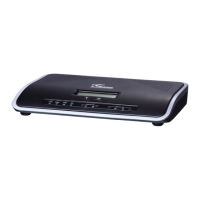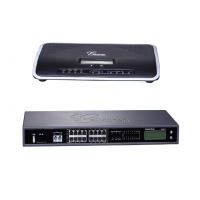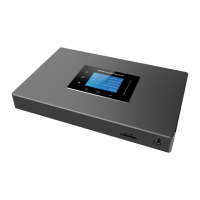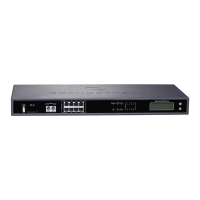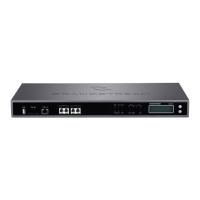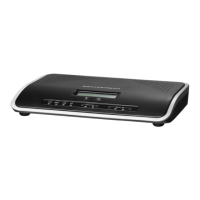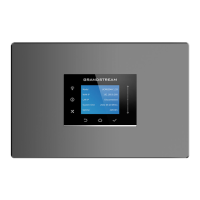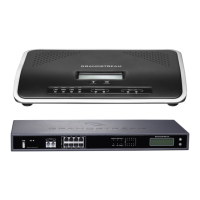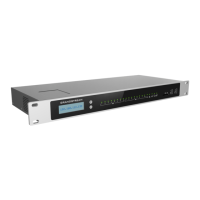



Do you have a question about the Grandstream Networks UCM6102 and is the answer not in the manual?
Provides detailed specifications for interfaces, codecs, protocols, security, physical dimensions, and compliance.
Explains how to manage users, including creating accounts, setting privileges, and accessing user information.
Covers network configuration parameters, including LAN, WAN, 802.1X, and Port Forwarding settings.
Details basic network configuration parameters like IP Method, IP Address, Subnet Mask, and Gateway IP.
Details firewall configurations to prevent malicious attacks and manage traffic for security.
Guides on changing the default web UI access password for enhanced security.
Explains the embedded LDAP server for managing corporate phonebooks centrally.
Covers configuration for sending alert emails, fax-to-email, and voicemail-to-email.
Details how to configure time settings, including auto time updating and manual time setting.
Explains how to manage recording storage, selecting where to store call recordings.
Details the three methods of auto provisioning: SIP SUBSCRIBE, DHCP OPTION 66, and mDNS.
Explains how to manually discover devices using IP address or scanning the network via PING, ARP, or SIP Message.
Covers global configuration that applies to all connected Grandstream SIP devices in the LAN.
Explains how to configure global policies for localization, phone settings, contact list, maintenance, network, and customization.
Describes how to create and use global templates with different configuration sets for devices.
Explains applying model-specific configurations to devices by creating and managing model templates.
Covers creating new devices, deleting existing ones, and making special configurations for single devices.
Guides on creating a new device and configuring basic settings before discovery.
Explains how to view and manage devices created manually or discovered via Auto Discover.
Guides on manually creating new SIP, IAX, or FXS users with their respective configuration parameters.
Details the configuration parameters for creating a new SIP extension, categorized into Basic, Media, Features, and Specific Time.
Outlines the configuration parameters for creating a new IAX extension, covering General, SIP/IAX, and IAX settings.
Explains the configuration parameters for creating a new FXS extension, including General, Analog, and SIP settings.
Describes how to use Batch Add for creating standardized SIP or IAX extension accounts efficiently.
Explains how to search, edit, reboot, and delete extensions, and modify selected extensions in batch.
Details how to add, edit, and delete analog trunks, including configuration parameters.
Explains configuration parameters for analog trunks like Channels, Trunk Name, SLA Mode, and Barge Allowed.
Covers how to configure VoIP trunks (SIP, IAX) and manage their settings, including detection and editing.
Explains Direct Outward Dialing, a service allowing connection to outside lines directly via specific numbers.
Explains how to create and edit outbound calling rules, pairing extension patterns with trunks for dialing.
Guides on configuring inbound routes to manage incoming calls based on DID patterns and destinations.
Details the configuration parameters for inbound rules, including Trunks, DID Pattern, Privilege Level, and Default Destination.
Details how to configure conference bridges, including Extension, Password, Admin Password, and various options.
Guides on creating, editing, viewing, and deleting IVR configurations and their parameters.
Covers global voicemail settings such as greeting duration, operator extension, message limits, and message time.
Explains how users can access their voicemail by dialing feature codes and navigating the IVR menu.
Details how to configure voicemail to be sent as an email attachment, including template variables.
Explains how to configure ring group settings, including name, extension, members, and ring strategy.
Explains how to configure call queue settings, including extension, name, strategy, and agent management.
Guides on configuring FAX/T.38 settings, including error correction, transfer rates, and default email.
Lists all available feature codes for call recording, transfer, call forward, call park, and other call features.
Explains how to record audio during calls manually or automatically and retrieve recordings.
Covers general SIP settings like Realm, Bind UDP Port, Allow Guest Calls, and MWI From.
Monitors the status of Trunks, Extensions, Queues, Conference Rooms, Interfaces, and Parking Lot.
Displays system information such as General (hardware/software), Network, Storage Usage, and Resource Usage.
Provides records of telephone exchange activities, documenting call details passing through the PBX.
Guides on filtering call reports by date range and criteria to generate specific reports.
Describes how to upgrade the UCM6100 to a new firmware version remotely or locally.
Explains how to back up the UCM6100 configuration locally or via network for restoration.
Guides on creating, uploading, downloading, restoring, and deleting backup files for configurations.
Explains how to restore the UCM6100 configuration from a backup file, either from the device or uploaded from PC.
Guides on performing factory resets (User Data or All) and rebooting the device.
Covers troubleshooting tools like capturing traces, pinging hosts, and tracerouting remote hosts.
Explains how to enable or disable SSH access directly from the web UI or LCD screen.
| Brand | Grandstream Networks |
|---|---|
| Model | UCM6102 |
| Category | PBX |
| Language | English |

